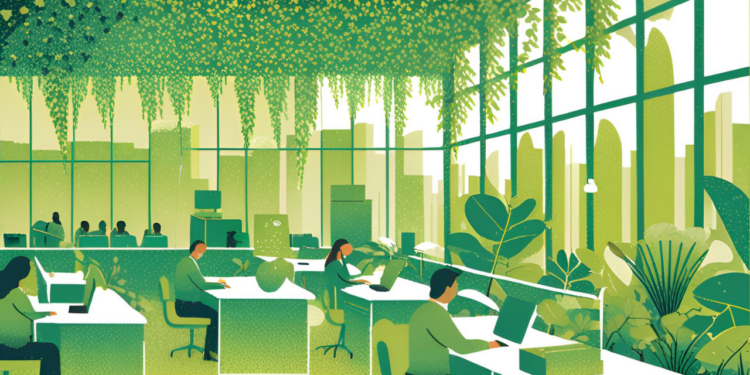- A recent survey of flexible workspace operators by The Instant Group uncovered a surprising disconnect between perceived ideas of what operators believe matters most versus the sustainability elements that truly deliver change.
- Recycling is important, but it’s not the cornerstone of a truly sustainable workplace. If operators want to be genuine partners in sustainability, they need to look beyond the basics.
- Pickering offers four tips for operators looking to be a better, greener partner to members of their spaces.
This article was written by Sam Pickering, Executive Director, Sustainability, The Instant Group. Pickering is recognized for his extensive expertise and accomplishments in driving sustainable practices. With a robust background, Sam brings a wealth of knowledge about net zero goals and their implications for the flexible workspace industry.
As flexible workspaces evolve to meet changing expectations of both members and employees, sustainability has become a buzzword that operators want to champion. Are the efforts being made truly impactful, or are they just scratching the surface?
A recent survey of flexible workspace operators by The Instant Group uncovered a surprising disconnect between perceived ideas of what operators believe matters most versus the sustainability elements that truly deliver change.
Perception: Recycling Reigns Supreme
When asked about the most compelling sustainability element in their flexible workspace locations, operators overwhelmingly pointed to their recycling policies. Nearly 29% of respondents believed this was their top contribution to sustainability, followed by the use of renewable energy (25%), sustainability certifications (21%), transparent data (14%), and low carbon design (12%).
Reality: The Renewable Energy Blind Spot
The survey revealed a significant knowledge gap: although nearly a quarter of operators claimed to use renewable energy, more than a third were unable to validate this and cannot confirm where their energy supply is sourced from.
The lack of awareness highlights a deeper issue — operators may not fully understand or track the most impactful sustainability measures.
Challenge: Costs, ROI, Expertise
Operators acknowledge the importance of integrating sustainability into their spaces, but they also face significant hurdles. The biggest challenge? Costs, with a staggering 76% of operators citing it as their primary concern.
This is followed by uncertainty around return on investment (41%), and a lack of knowledge or expertise in sustainable practices (35%)
Delivering Change: Towards Green Leadership
Recycling is important, but it’s not the cornerstone of a truly sustainable workplace. If operators want to be genuine partners in sustainability, they need to look beyond the basics.
Here are four tips for operators looking to be a better, greener partner to members of their spaces:
1. Green-light the green lease clause
Work closely with landlords to incorporate green lease clauses that ensure both parties are committed to sustainability. This can include stipulations around energy efficiency, waste management, sustainable building practices, and most importantly data sharing.
2. Conduct a Carbon Footprint Evaluation
Regularly assess your portfolio’s carbon emissions and implement strategies to reduce them. This not only helps the environment but also positions your brand as a leader in sustainability and is a proactive approach to managing the environmental credentials of your assets.
3. Make Data-driven Decisions
Collect and analyze sustainability data from the perspective of the end-user. This insight is invaluable in tailoring spaces to meet real needs. Case studies from operators who have adopted this approach can demonstrate that clients are more likely to engage in sustainable practices when they can see the direct impact.
4. Recognize Certification Matters
Evaluate and pursue certifications, ensuring that chosen certifications align with your ESG goals and enhance the end-user experience. This not only reassures clients, but also differentiates your spaces in a competitive market. At Instant, we just launched with IWBI the WELL Coworking Rating, one example of a public-facing seal that shows how coworking and flexible workspaces meet evidence-based health and well-being measures.
The Path Forward: Go Beyond The Checklist
True sustainable impact isn’t about ticking boxes; it’s about making informed, impactful decisions that benefit the environment, business performance and the people who occupy your spaces.
As the industry evolves, so too must the approach to sustainability. By leveraging technology, expert advice, and transparent practices, flex space operators have the power to turn sustainability from a buzzword to reality.
Interested in more insights from Sam Pickering? Listen to the Allwork.Space Future of Work podcast episode where he discusses the link between sustainability, employee wellness, and the future of coworking spaces.

















